译林七下英语Unit 8 Pets Reading 课件(32张ppt)
文档属性
| 名称 | 译林七下英语Unit 8 Pets Reading 课件(32张ppt) | 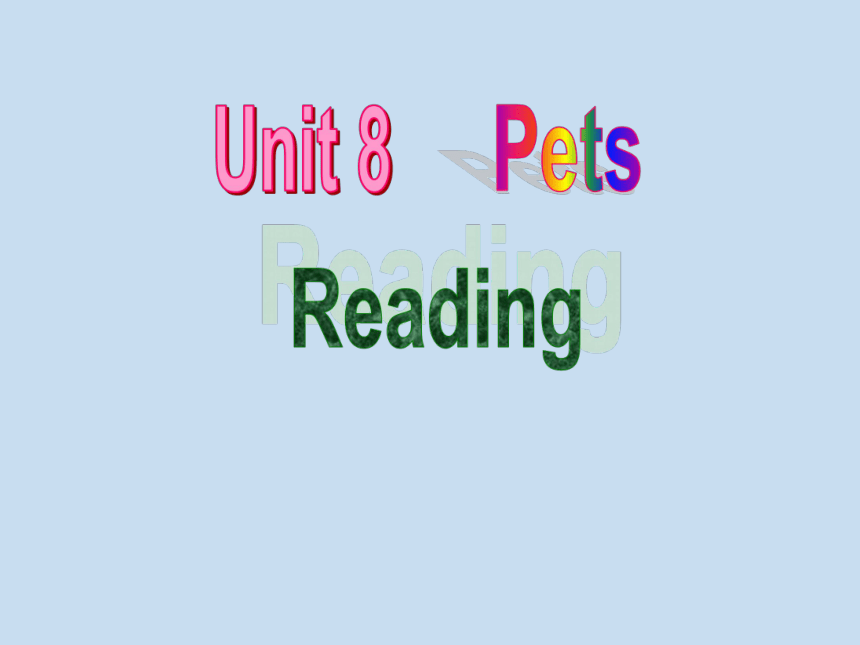 | |
| 格式 | ppt | ||
| 文件大小 | 6.5MB | ||
| 资源类型 | 教案 | ||
| 版本资源 | 牛津译林版 | ||
| 科目 | 英语 | ||
| 更新时间 | 2021-10-26 14:42:49 | ||
图片预览

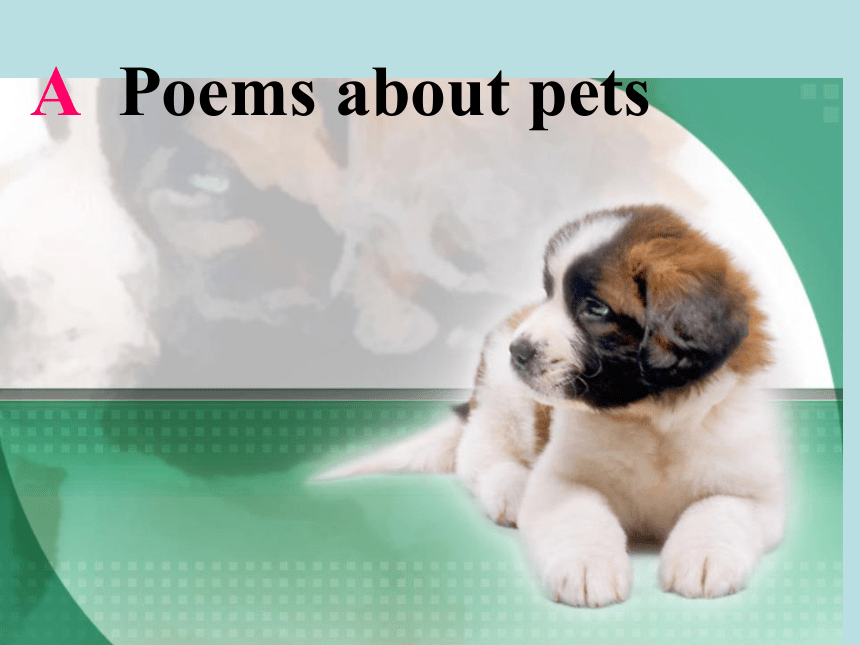
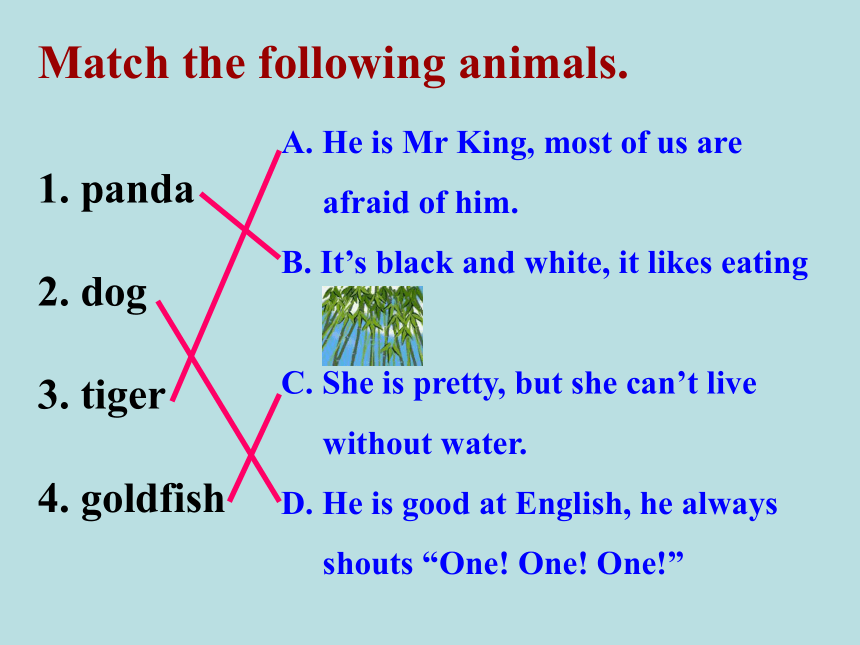
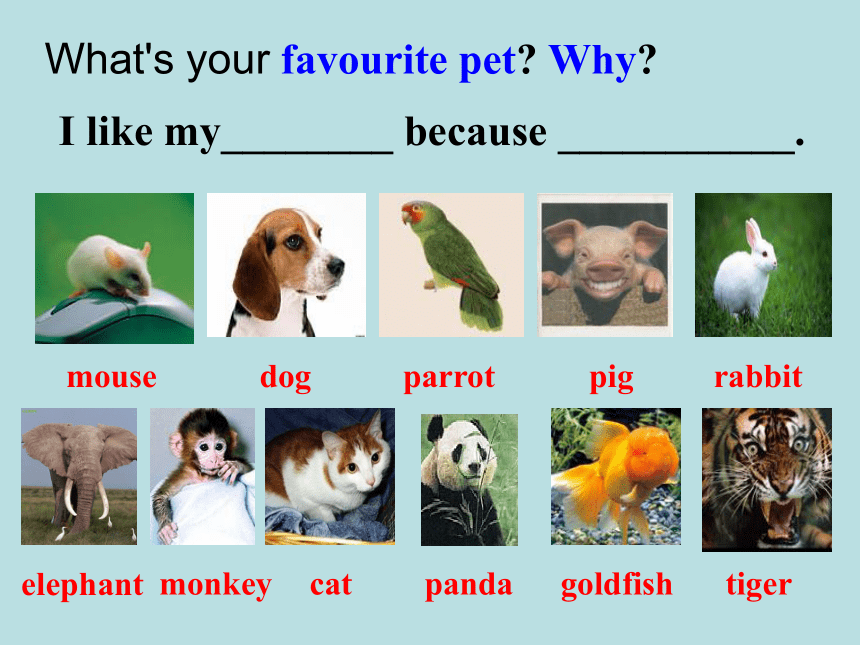
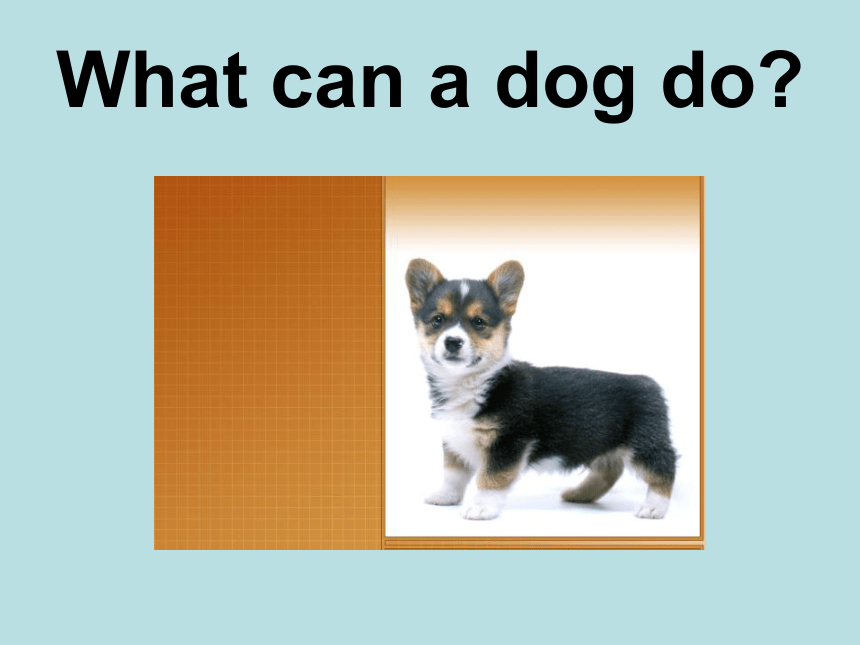
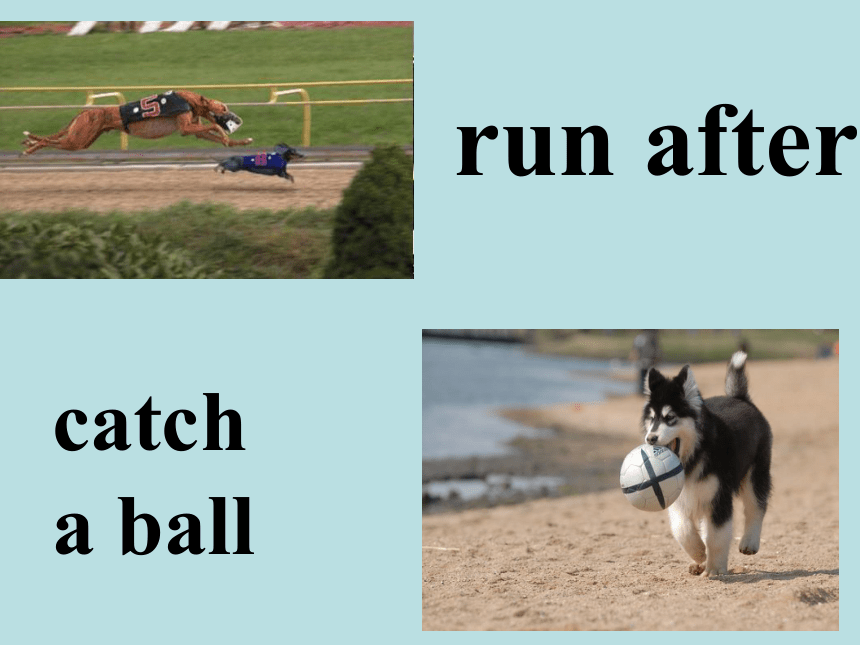
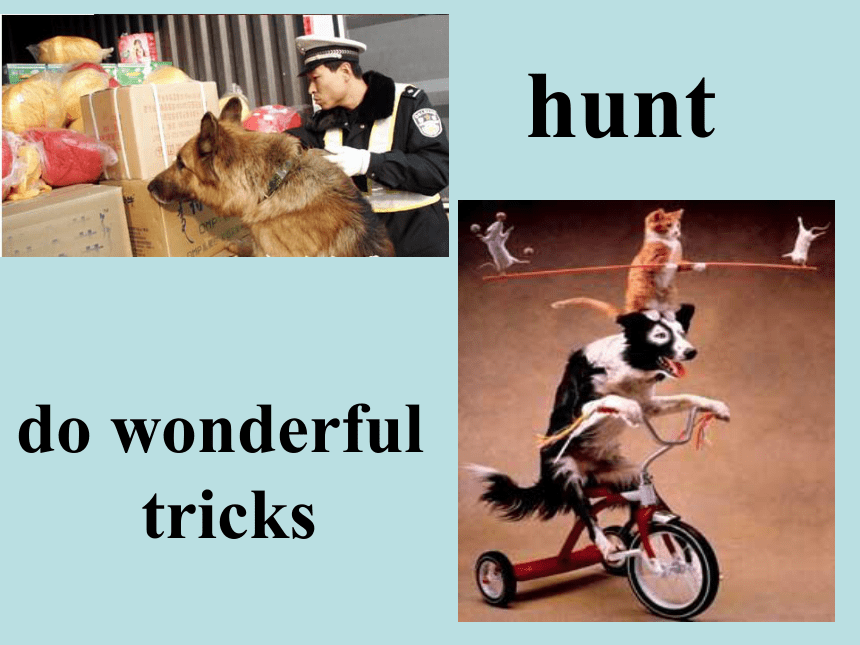
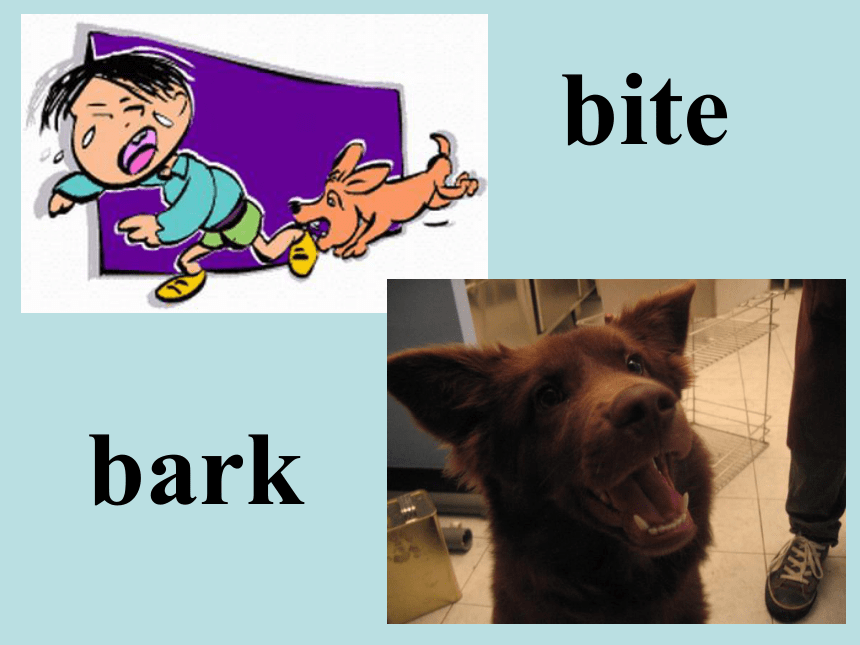

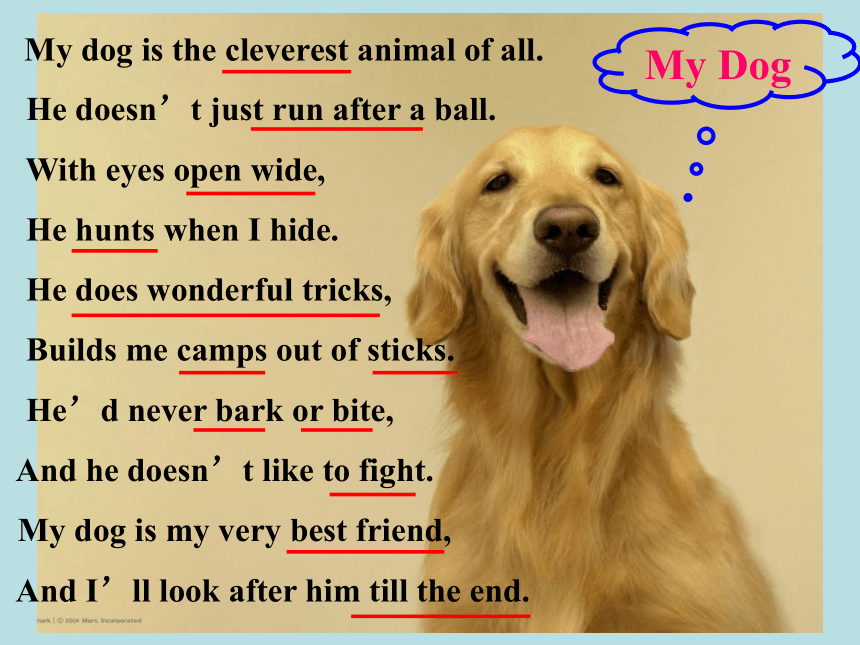
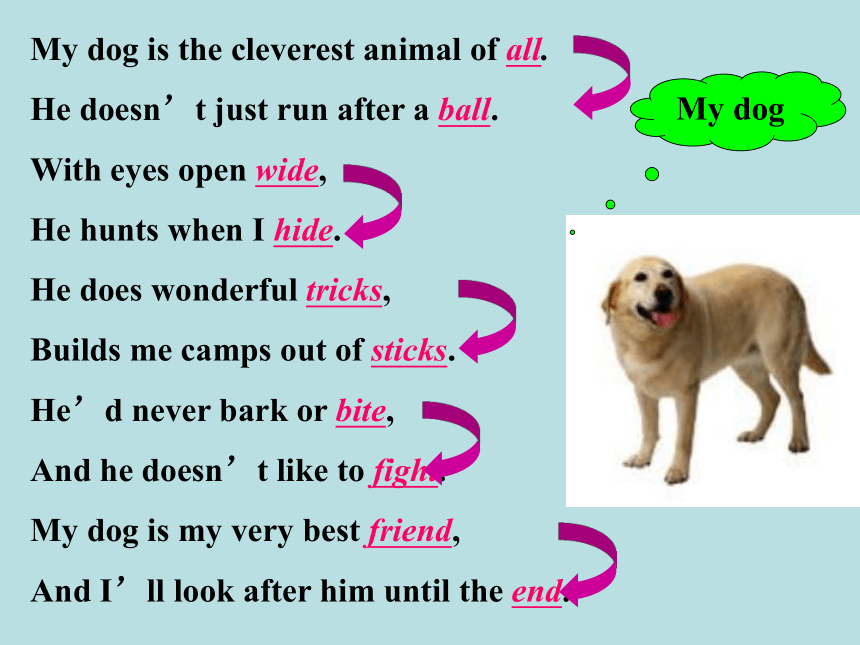
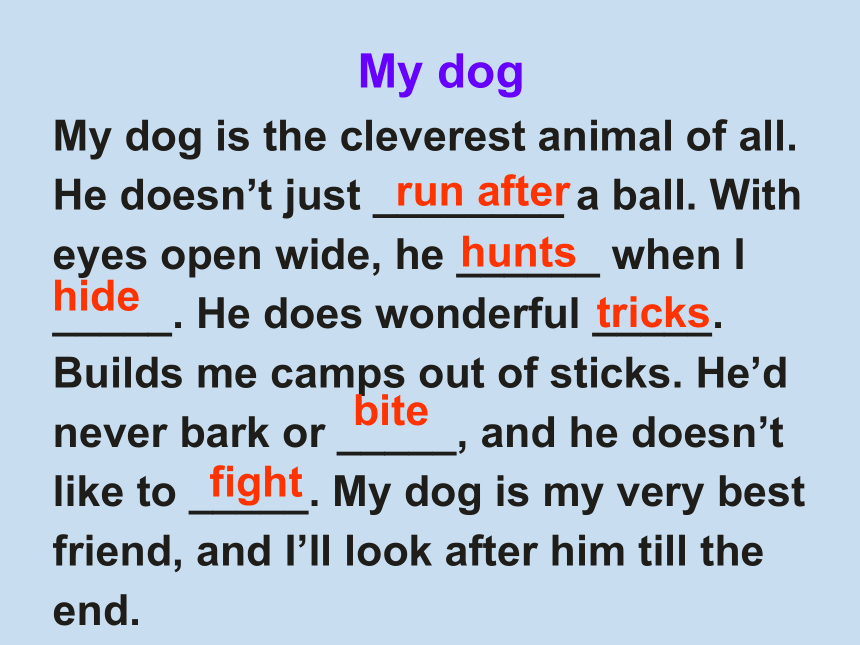
文档简介
(共32张PPT)
A Poems about pets
1. panda
2. dog
3. tiger
4. goldfish
Match the following animals.
A. He is Mr King, most of us are
afraid of him.
B. It’s black and white, it likes eating
C. She is pretty, but she can’t live
without water.
D. He is good at English, he always
shouts “One! One! One!”
What's your favourite pet Why
I like my________ because ___________.
tiger
goldfish
pig
elephant
rabbit
dog
monkey
cat
parrot
mouse
panda
What can a dog do
run after
catch
a ball
hunt
do wonderful
tricks
bite
bark
fight
hide
My dog is the cleverest animal of all.
He doesn’t just run after a ball.
With eyes open wide,
He hunts when I hide.
He does wonderful tricks,
Builds me camps out of sticks.
He’d never bark or bite,
And he doesn’t like to fight.
My dog is my very best friend,
And I’ll look after him till the end.
My Dog
My dog is the cleverest animal of all.
He doesn’t just run after a ball.
With eyes open wide,
He hunts when I hide.
He does wonderful tricks,
Builds me camps out of sticks.
He’d never bark or bite,
And he doesn’t like to fight.
My dog is my very best friend,
And I’ll look after him until the end.
My dog
My dog is the cleverest animal of all. He doesn’t just ________ a ball. With eyes open wide, he ______ when I _____. He does wonderful _____. Builds me camps out of sticks. He’d never bark or _____, and he doesn’t like to _____. My dog is my very best friend, and I’ll look after him till the end.
run after
hunts
hide
tricks
bite
fight
My dog
1. Is your dog the cleverest animal of all
2. Does he just run after a ball
3. Does he do wonderful tricks
4. Will you look after him till the end
Yes, it is.
No, he does not.
Yes, he does.
Yes, I will.
Read the poem about
My dog
and finish the exercise of
Part B2 on page 95.
Match the sentences
1. He doesn’t just
run after a ball.
2. He hunts when I
hide.
3. He does
wonderful tricks.
4. He’d never bark
or bite.
5. And I’ll look
after him till
the end.
A. He does
amazing things.
B. He can run after
a ball and do
other things.
C. He looks around
for me.
D. And I will always
take care of him.
E. He is friendly.
Does a goldfish run after another fish
Does a goldfish hide
Does a goldfish bark
Does a goldfish fight
Does a goldfish bite
Does a goldfish miaow
Does a goldfish eat much
Does a goldfish need a
bed
bubble
Read the poem about
My goldfish
and finish the exercise of
Part B3 on page 96.
My goldfish is a wonderful pet.
She doesn’t need a bed.
She isn’t any trouble.
She doesn’t bark,
She doesn’t miaow,
Just bubbles,
Bubbles, bubbles.
My goldfish is a wonderful pet.
She doesn’t need a bed.
She isn’t any trouble.
We don’t have to feed her much,
She doesn’t need a gentle touch,
Just bubbles,
Bubbles, bubbles.
My goldfish
1. Is your goldfish a wonderful pet
2. Does she bark or miaow
3. Do we have to feed her much
4. What does she just do
Yes, it is.
No, she does not.
No, we do not.
She just bubbles.
A goldfish isn’t any trouble.
It doesn’t ______.
It doesn’t _______.
We don’t need to ______ it much.
It doesn’t need a gentle _________.
Just bubbles, bubbles, bubbles.
bark
miaow
feed
touch
Do exercises of
Part B1
on page 95.
1. All rhymes with ______.
2. Hide rhymes with ______.
3. Sticks rhymes with ______.
4. Bite rhymes with ______.
5. Friend rhymes with _____.
6. Bed rhymes with ______.
7. Bubble rhymes with _______.
8. Much rhymes with ______.
fight
end
trouble
pet
touch
ball
wide
tricks
Words rhyme if the last syllables make the same or similar sound.
Some language points:
1. My dog is the cleverest animal of all.
1) 形容词最高级前须加定冠词the。
2) 使用最高级时,句子后面通常跟一个 of 或 in 引导
的介词短语表示在……范围。
of + 表示同一类的人或物的名词;
in + 表示场所或范围类的名词;
He is the tallest of the three children.
He is the tallest in our class.
2.With eyes open wide, he hunts when I hide.
当我躲起来,他就把眼睛睁得大大的,到处找我。
open wide表示“睁得很大”;wide作副词修饰open, 意思是“充分地”。例如:
‘Keep your mouth wide open’, said the dentist.
牙医说:“张大嘴。”
3. Builds me camps out of sticks.
1) build sb. sth. = build sth. for sb.
2) build sth. out of sth. = build sth. with sth. /
use sth. to build sth.
They built us a wooden house out of wood. =
They built a wooden house ___ us ____ wood.
They ____ wood ___ _____ a wooden house
for us.
for
with
used
to
build
4.My dog is my best friend,
And I’ll look after him till the end.
我的狗是我最好的朋友,我会照顾他一直到最后。
句中的till是介词,表示“直到……为止”,其前面的动词是持续性动词。如:
The meeting lasted from two o'clock till six o'clock.
会议由两点一直持续到六点。
这里trouble的意思是“麻烦”。trouble可用作动词,表示“使忧虑”、“麻烦”、“费心”。trouble用作名词时,可作可数名词,表示“各种各样的困难”,它也作不可数名词,表示“苦恼”、“困难”、“麻烦”。如:
5.She isn’t any trouble.
她一点也不麻烦。
May I trouble you to pass me the salt, please
麻烦您把盐递给我好吗
His heart was full of trouble.
他的内心充满了烦恼。
She has a lot of family troubles.
她有许多家庭上的困难。
I have some trouble in learning English.
我在学英语上有些困难。
Don’t trouble trouble until trouble troubles you. 不要自找麻烦。
第一个是动词,祈使句用原形;
第二个是名词;
第三个是名词;
第四个是动词,可数名词单数后用动词单数。
6. We don’t have to feed her much.
have to :受客观因素制约,“只好,不得不”;
must :主观上 “必须”;
have to 有更多的时态、人称、数的变化形式。
My bike is broken. So I ______ walk to school.
A/ must B/ have to
C/ can D/ may
A Poems about pets
1. panda
2. dog
3. tiger
4. goldfish
Match the following animals.
A. He is Mr King, most of us are
afraid of him.
B. It’s black and white, it likes eating
C. She is pretty, but she can’t live
without water.
D. He is good at English, he always
shouts “One! One! One!”
What's your favourite pet Why
I like my________ because ___________.
tiger
goldfish
pig
elephant
rabbit
dog
monkey
cat
parrot
mouse
panda
What can a dog do
run after
catch
a ball
hunt
do wonderful
tricks
bite
bark
fight
hide
My dog is the cleverest animal of all.
He doesn’t just run after a ball.
With eyes open wide,
He hunts when I hide.
He does wonderful tricks,
Builds me camps out of sticks.
He’d never bark or bite,
And he doesn’t like to fight.
My dog is my very best friend,
And I’ll look after him till the end.
My Dog
My dog is the cleverest animal of all.
He doesn’t just run after a ball.
With eyes open wide,
He hunts when I hide.
He does wonderful tricks,
Builds me camps out of sticks.
He’d never bark or bite,
And he doesn’t like to fight.
My dog is my very best friend,
And I’ll look after him until the end.
My dog
My dog is the cleverest animal of all. He doesn’t just ________ a ball. With eyes open wide, he ______ when I _____. He does wonderful _____. Builds me camps out of sticks. He’d never bark or _____, and he doesn’t like to _____. My dog is my very best friend, and I’ll look after him till the end.
run after
hunts
hide
tricks
bite
fight
My dog
1. Is your dog the cleverest animal of all
2. Does he just run after a ball
3. Does he do wonderful tricks
4. Will you look after him till the end
Yes, it is.
No, he does not.
Yes, he does.
Yes, I will.
Read the poem about
My dog
and finish the exercise of
Part B2 on page 95.
Match the sentences
1. He doesn’t just
run after a ball.
2. He hunts when I
hide.
3. He does
wonderful tricks.
4. He’d never bark
or bite.
5. And I’ll look
after him till
the end.
A. He does
amazing things.
B. He can run after
a ball and do
other things.
C. He looks around
for me.
D. And I will always
take care of him.
E. He is friendly.
Does a goldfish run after another fish
Does a goldfish hide
Does a goldfish bark
Does a goldfish fight
Does a goldfish bite
Does a goldfish miaow
Does a goldfish eat much
Does a goldfish need a
bed
bubble
Read the poem about
My goldfish
and finish the exercise of
Part B3 on page 96.
My goldfish is a wonderful pet.
She doesn’t need a bed.
She isn’t any trouble.
She doesn’t bark,
She doesn’t miaow,
Just bubbles,
Bubbles, bubbles.
My goldfish is a wonderful pet.
She doesn’t need a bed.
She isn’t any trouble.
We don’t have to feed her much,
She doesn’t need a gentle touch,
Just bubbles,
Bubbles, bubbles.
My goldfish
1. Is your goldfish a wonderful pet
2. Does she bark or miaow
3. Do we have to feed her much
4. What does she just do
Yes, it is.
No, she does not.
No, we do not.
She just bubbles.
A goldfish isn’t any trouble.
It doesn’t ______.
It doesn’t _______.
We don’t need to ______ it much.
It doesn’t need a gentle _________.
Just bubbles, bubbles, bubbles.
bark
miaow
feed
touch
Do exercises of
Part B1
on page 95.
1. All rhymes with ______.
2. Hide rhymes with ______.
3. Sticks rhymes with ______.
4. Bite rhymes with ______.
5. Friend rhymes with _____.
6. Bed rhymes with ______.
7. Bubble rhymes with _______.
8. Much rhymes with ______.
fight
end
trouble
pet
touch
ball
wide
tricks
Words rhyme if the last syllables make the same or similar sound.
Some language points:
1. My dog is the cleverest animal of all.
1) 形容词最高级前须加定冠词the。
2) 使用最高级时,句子后面通常跟一个 of 或 in 引导
的介词短语表示在……范围。
of + 表示同一类的人或物的名词;
in + 表示场所或范围类的名词;
He is the tallest of the three children.
He is the tallest in our class.
2.With eyes open wide, he hunts when I hide.
当我躲起来,他就把眼睛睁得大大的,到处找我。
open wide表示“睁得很大”;wide作副词修饰open, 意思是“充分地”。例如:
‘Keep your mouth wide open’, said the dentist.
牙医说:“张大嘴。”
3. Builds me camps out of sticks.
1) build sb. sth. = build sth. for sb.
2) build sth. out of sth. = build sth. with sth. /
use sth. to build sth.
They built us a wooden house out of wood. =
They built a wooden house ___ us ____ wood.
They ____ wood ___ _____ a wooden house
for us.
for
with
used
to
build
4.My dog is my best friend,
And I’ll look after him till the end.
我的狗是我最好的朋友,我会照顾他一直到最后。
句中的till是介词,表示“直到……为止”,其前面的动词是持续性动词。如:
The meeting lasted from two o'clock till six o'clock.
会议由两点一直持续到六点。
这里trouble的意思是“麻烦”。trouble可用作动词,表示“使忧虑”、“麻烦”、“费心”。trouble用作名词时,可作可数名词,表示“各种各样的困难”,它也作不可数名词,表示“苦恼”、“困难”、“麻烦”。如:
5.She isn’t any trouble.
她一点也不麻烦。
May I trouble you to pass me the salt, please
麻烦您把盐递给我好吗
His heart was full of trouble.
他的内心充满了烦恼。
She has a lot of family troubles.
她有许多家庭上的困难。
I have some trouble in learning English.
我在学英语上有些困难。
Don’t trouble trouble until trouble troubles you. 不要自找麻烦。
第一个是动词,祈使句用原形;
第二个是名词;
第三个是名词;
第四个是动词,可数名词单数后用动词单数。
6. We don’t have to feed her much.
have to :受客观因素制约,“只好,不得不”;
must :主观上 “必须”;
have to 有更多的时态、人称、数的变化形式。
My bike is broken. So I ______ walk to school.
A/ must B/ have to
C/ can D/ may
